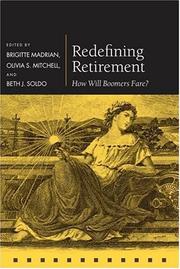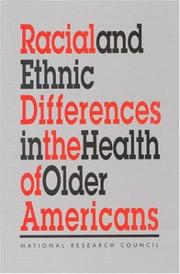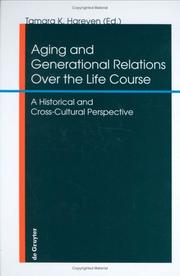| Listing 1 - 10 of 11 | << page >> |
Sort by
|
Book
Year: 2006 Publisher: Cambridge, Mass. National Bureau of Economic Research
Abstract | Keywords | Export | Availability | Bookmark
 Loading...
Loading...Choose an application
- Reference Manager
- EndNote
- RefWorks (Direct export to RefWorks)

ISBN: 9780199230778 0199230773 Year: 2007 Publisher: Oxford Oxford university press
Abstract | Keywords | Export | Availability | Bookmark
 Loading...
Loading...Choose an application
- Reference Manager
- EndNote
- RefWorks (Direct export to RefWorks)
Baby boom generation --- Medical care --- Older people --- Retirement income --- Retirement --- Forecasting. --- Employment --- Government policy --- Economic aspects --- inkomensverdeling --- levensstandaard --- macro-economie --- pensioen --- vergrijzing --- welvaartseconomie --- Forecasting
Digital
Year: 2006 Publisher: Cambridge, Mass. NBER
Abstract | Keywords | Export | Availability | Bookmark
 Loading...
Loading...Choose an application
- Reference Manager
- EndNote
- RefWorks (Direct export to RefWorks)
Book
ISBN: 9780199230773 Year: 2007 Publisher: Oxford Oxford University Press
Abstract | Keywords | Export | Availability | Bookmark
 Loading...
Loading...Choose an application
- Reference Manager
- EndNote
- RefWorks (Direct export to RefWorks)

ISBN: 0309054893 9786610192298 1280192291 0309553067 0585030138 9780585030135 9780309054898 9781280192296 6610192294 9780309553063 0309175569 9780309175562 Year: 1997 Publisher: Washington, D.C. : National Academy Press,
Abstract | Keywords | Export | Availability | Bookmark
 Loading...
Loading...Choose an application
- Reference Manager
- EndNote
- RefWorks (Direct export to RefWorks)
Minority older people --- Health Status --- Socioeconomic Factors --- Aged --- Ethnic Groups --- Continental Population Groups --- Population Groups --- Demography --- Population Characteristics --- Adult --- Sociology --- Age Groups --- Epidemiologic Measurements --- Persons --- Health Care --- Social Sciences --- Anthropology, Education, Sociology and Social Phenomena --- Named Groups --- Public Health --- Environment and Public Health --- Medical Statistics --- Health & Biological Sciences --- Health and hygiene --- Diseases --- Ethnic older people --- Minority aged --- Older minority members --- Older people
Book
ISBN: 0309585368 9780309585361 Year: 1994 Publisher: Washington, D.C. National Academy Press
Abstract | Keywords | Export | Availability | Bookmark
 Loading...
Loading...Choose an application
- Reference Manager
- EndNote
- RefWorks (Direct export to RefWorks)
Book
Year: 1994 Publisher: Washington, D.C. : National Academy Press,
Abstract | Keywords | Export | Availability | Bookmark
 Loading...
Loading...Choose an application
- Reference Manager
- EndNote
- RefWorks (Direct export to RefWorks)
Aging -- Physiological aspects. --- Electronic books. -- local. --- Older people with disabilities. --- Aging --- Physiological aspects.
Book
Year: 2006 Publisher: Cambridge, Mass. National Bureau of Economic Research
Abstract | Keywords | Export | Availability | Bookmark
 Loading...
Loading...Choose an application
- Reference Manager
- EndNote
- RefWorks (Direct export to RefWorks)
Baby Boomers have left a unique imprint on US culture and society in the last 60 years, and it might be anticipated that they will also put their own stamp on retirement, the last phase of the life cycle. Yet because Boomers have not all fully retired, we cannot yet judge how they will fare as retirees. Instead, we focus on how this group compares with prior groups on the verge of retirement, that is, at ages 51-56. Accordingly, this chapter evaluates the stock of health which Early Boomers bring to retirement and compare these to the circumstances of two prior cohorts at the same point in their life cycles. Using three sets of responses from the Health and Retirement Study, we find some interesting patterns. Overall, the raw evidence indicates that Boomers on the verge of retirement are in poorer health their counterparts 12 years ago. Using a summary health index designed for this study, we find that those born 1948 to 1953 share health risks with the War Baby cohort. This suggests that most of the health decline instead began before the late 1940's. A more complex set of health conclusions emerges from the specific self-reported health measures. Boomers indicate they have relatively more difficulty with a range of everyday physical tasks, but they also report having more pain, more chronic conditions, more drinking and psychiatric problems, than their HRS earlier counterparts. This trend portends poorly for the future health of Boomers as they age and incur increasing costs associated with health care and medications. Using our health index, only those at the 75th percentile or higher are likely to be characterized as having good or better health.
Book
ISBN: 1281150312 1435622073 9786611150310 019152817X Year: 2007 Publisher: Oxford ; New York : Oxford University Press,
Abstract | Keywords | Export | Availability | Bookmark
 Loading...
Loading...Choose an application
- Reference Manager
- EndNote
- RefWorks (Direct export to RefWorks)
As the leading edge of the 'Baby Boom' generation attains age 60, members of this unusually large cohort born 1946-66 are poised to redefine retirement - just as they have restructured educational, housing, and labor markets in prior days. Looking ahead, their numbers and energy are sure to have a major impact on national pensions, healthcare, and social safety nets. Contributors to this volume note that 'Boomers' will be better off than their predecessors in many ways, havingbenefited from the long run-up in housing prices, dramatic improvements in healthcare, and the expanding economy. On th
Baby boom generation --- Retirement --- Retirement income --- Medical care --- Older people --- Economic aspects --- Forecasting. --- Employment --- Government policy


ISBN: 3110138751 3111780317 3110875527 9783110875522 9783110138757 Year: 2012 Publisher: Berlin Boston
Abstract | Keywords | Export | Availability | Bookmark
 Loading...
Loading...Choose an application
- Reference Manager
- EndNote
- RefWorks (Direct export to RefWorks)
This book represents an original collection of essays which examine generational relations over the life course, esp. as they affect supports in the later years of life. Focussing on historic and contemporay Europe, the USA, and Asia, each essay examines the impact of social change on generational supports in the later years of life. By following a life course perspective, the essays illuminate the ways in which relationships of care-giving are formed over life and are adapted in relation to institutional and societal changes. [publisher's description]
Aged --- -Aged --- -Aging --- -Intergenerational relations --- -Intergenerational relationships --- Relations, Intergenerational --- Relationships, Intergenerational --- Interpersonal relations --- Age --- Ageing --- Senescence --- Developmental biology --- Gerontology --- Longevity --- Age factors in disease --- Aging people --- Elderly people --- Old people --- Older adults --- Older persons --- Senior citizens --- Seniors (Older people) --- Age groups --- Persons --- Gerontocracy --- Old age --- Care --- -History --- -Cross-cultural studies --- -Congresses --- Family relationships --- History --- Physiological effect --- Aging --- Intergenerational relations --- Older people --- Cross-cultural studies --- Congresses. --- -Care --- Intergenerational relationships --- History&delete& --- Cross-cultural studies&delete& --- Congresses
| Listing 1 - 10 of 11 | << page >> |
Sort by
|

 Search
Search Feedback
Feedback About UniCat
About UniCat  Help
Help News
News